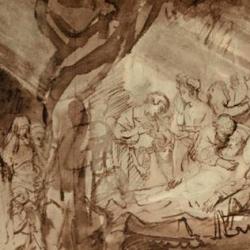There were a few interesting insights from the session on de Lubac and biblical interpretation at SBL this morning.
Margaret Adam of Duke presented a comparative study of Frei and de Lubac, arguing that Frei’s notion of a “stretchy literal sense” does not do justice to the complexity of Scripture, the actual phenomenon of hermeneutical and interpretive difference, and betrays a faulty view of nature and grace. De Lubac came off better on all counts. The last point was particularly intriguing, since it unites de Lubac’s work on supernatural and his work on medieval exegesis in a way that I’d never done. She argued that Frei notion that the “plain sense” controls interpretation assumes an “ungraced nature,” as when Frei speaks of the natural limits of textual sense. de Lubac, by contrast, does not see any dualism of nature and grace, and recognizes that nature is always already graced. Thus, the “natural” or “literal” sense can be fecund and proliferate in a way that it cannot for Frei. Adam also suggested a connection between these two themes and de Lubac’s work on Eucharistic theology. To put it in a way that she didn’t: The fourfold sense holds together Scripture as the witness to the threefold body of Christ.
Lewis Ayres notes that for de Lubac reading the Scriptures is always a spiritual discipline, a means for the transformation and redemption of the soul. Recovering precritical exegesis, therefore, requires a recovery of an account of a soul and the recognition of reading as a means of sanctification, or as providing resources for the reformation of imagination and desire (almost a quote). Ayres, with some of the other speakers, pointed out that for de Lubac the fourfold is not really four distinct senses, but a progression from one sense to the next, an “intensification” of our grasp of the text (Ayres’ formulation, as I recall). Ayres also emphasized that de Lubac’s method requires that we recognize Scripture as a mirror that scrutinizes and exposes us, and is not an “object” for research. As he said at the beginning, de Lubac’s reading suggests directions for Scriptural interpretation that run against the grain of modern reading and interpretation. All to the good, I say.















